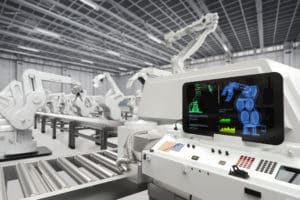Smart Factories and Automation
Representing the fourth industrial revolution, Industry 4.0 is a collective term embracing several automation, data exchange and manufacturing technologies. These technologies coalesce under Cyber-Physical Systems, the Internet of Things and the Internet of Services.
6 Design Principles
1. Interoperability
The ability of cyber-physical systems (i.e. workpiece carriers, assembly stations and products), humans and Smart Factories to connect and communicate with each other via the Internet of Things and the Internet of Services.
2. Virtualization
A virtual copy of the Smart Factory which is created by linking sensor data (from monitoring physical processes) with virtual plant models and simulation models.
3. Decentralization
The ability of cyber-physical systems within Smart factories to make decisions on their own.
4. Real-Time Capability
The capability to collect and analyze data and provide the derived insights immediately.
5. Service Orientation
Offering of services (of cyber-physical systems, humans or Smart Factories) via the Internet of Services.
6. Modularity
Flexible adaptation of Smart Factories to changing requirements by replacing or expanding individual modules.
IIoT (Industrial Internet Of Things)
Over the past three decades JAYCOR has witnessed globalization and the enormous step-change in the evolution of technology and the impact it has had on businesses and consumers. And within that change, connecting technology has provided the essential pillars to support an interconnected world, through the Internet of Things (IoT) and the Industrial Internet of Things (IIoT).Today’s cabling and connector technologies are pivotal to the advancements of big data, renewable energy, automation and the many other mission critical technologies that shape our present and future.

JAYCOR Automation Connectivity Solutions



